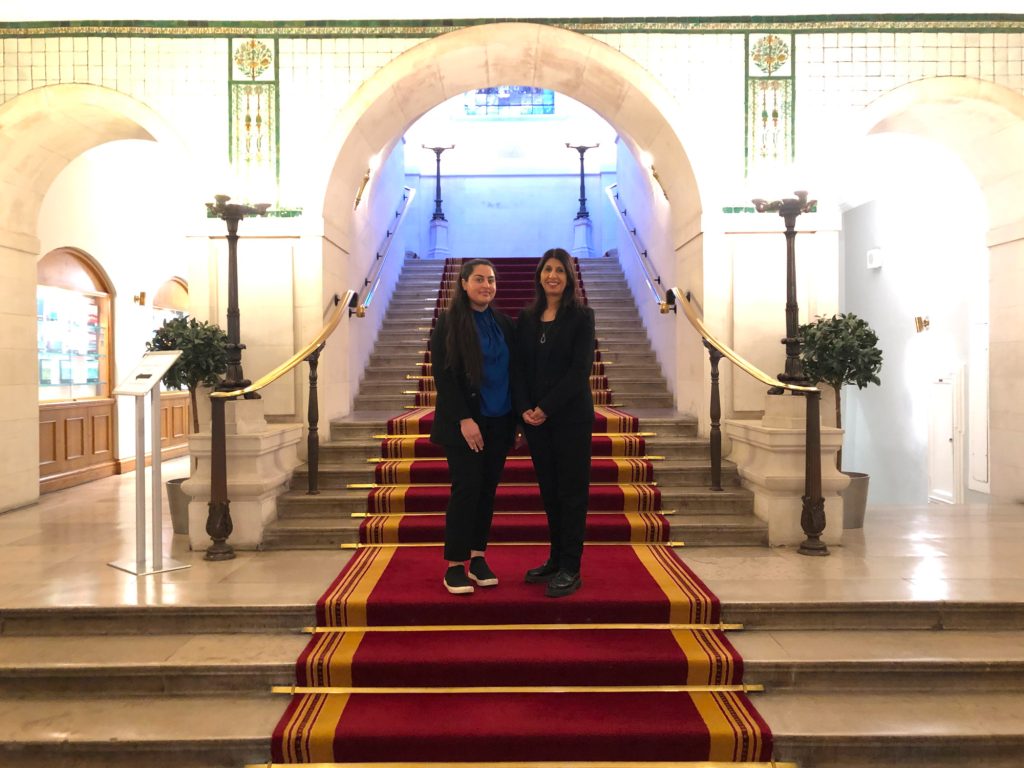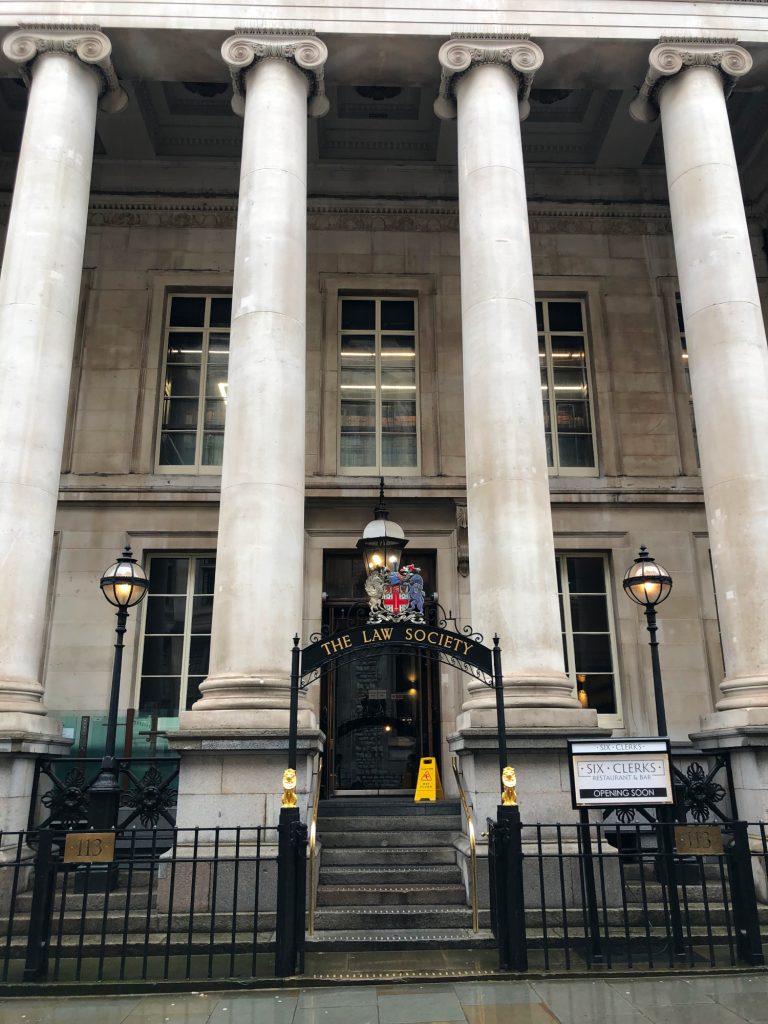Interview with Lubna Shuja, President of the Law Society of England and Wales

As the 178th President of the Law Society of England and Wales, Lubna Shuja is the first Asian, first Muslim, and seventh female President to take office since the Law Society was established in 1825, nearly 200 years ago. City LLB3 student Zainab Altaf had the opportunity to pose some questions to her…
What are your top tips for students wanting a career as a solicitor?
My first top tip would be to get work experience. A lot of students are unable to get work experience. The issue is that they only apply to law firms. It is important to look outside law firms to get work experience.
Some options for work experience outside of law firms are:
- 1. Many companies have in-house legal departments such as banks, insurance companies and retail high streets.
- 2. Community Advice centres where you can shadow someone who is giving legal advice.
- 3. Go and sit in court – this can be any court, such as a Magistrates Court, a County Court or a Crown Court. When you attend the court ask the usher what type of cases are listed that day? Is there anything interesting? Have you got a trial going on? Watching a hearing you will see the advocates, the barristers, and witnesses giving evidence. This will show you how a legal hearing works. This can be regarded as work experience as you are watching and learning how it takes place. Nowadays, many hearings are hybrid or online so students can even watch court hearings from home.
- 4. Local councils are fantastic for work experience as they tend to have a legal department which deals with diverse areas such as public childcare, housing cases, landlord and tenant issues and nuisance/noise issues etc.
Work experience is very important as it helps you to find out whether you enjoy law, and it can help you understand which areas of the law you have an interest in.
My second tip would be to network as much as you can. Through networking, you will get opportunities. If you get the chance to go to an event or function, this even applies in your social life such as at a wedding/party, talk to people who you have not met before You don’t know who they know and if you get on with them, they could mention your name to someone else for a particular opportunity. It is about networking and taking every opportunity that comes your way.

Do not be shy about networking. Talk to people who are on their own. Before you attend an event think about what you will say, be ready with conversation. This can include icebreakers – where have you travelled from? Talk about the weather, where have you been on holiday? And have something that you are willing to share about yourself. Something interesting about you that may help the other person to remember you.
Get on to social media and in particular LinkedIn. Follow people and learn about what is going on in the business world in areas that interest you. Post about things on there to connect with people. You will find out about events that are happening from LinkedIn so you can attend those. You can follow me on social media at:
LinkedIn: @LubnaShuja
Twitter: @Lubnashuja
Instagram: @legalswan and @the_law_society
How can the Law Society help to support law students?
The Law Society has a Diversity Access Scheme. This is a scholarship programme.
The purpose of this scheme is to provide support, as well as assistance with financial funding for the SQE or LPC, help you find work experience and to connect you with a mentor. This scheme is open to those who are from socially deprived backgrounds who might not otherwise be able to pursue a career in law. The details of this Scheme are on the Law Society website.
The scheme runs every year and this year the deadline for applications was 16th April 2023.
We do also have details on the Law Society website of other organisations which offer scholarships and bursaries to students. Have a look at our website to see the support that is provided…
We also have a number of Social Mobility Ambassadors. They are solicitors who have come from non-traditional backgrounds who are willing to act as role models to others. They are available for students to contact. Their details are also on the website. You can read each Ambassador’s story, their background and their journey to where they are now. This shows aspiring solicitors that they can get there as well.
The Law Society is now on TikTok too! Follow the Law Society on TikTok (@thelawsociety). The main aim of this is to reach out to not only existing members but also aspiring solicitors. We only recently launched our TikTok. We will put videos on there containing advice for students who want to get into a law career and giving them tips to follow.
How did you get into the legal profession?
I never planned to be a solicitor. My teachers never spoke to me about Law. I have been a solicitor for 31 years now. When I was at school, I was not encouraged to pursue it as a career. I had a couple of cousins who were journalists. They used to tell me about their jobs. This caught my interest, and I thought I could be a journalist so I applied for an English degree. I got a place at a university to do English but when A-level results arrived it turns out I had done far better than my teachers had predicted. At that point, a good friend suggested to me that I could get on to a law degree. This planted a seed in my head, and I looked into it. I ended up going through clearing and got a place at university to study law. I never knew anything about the law but when I started studying it, I absolutely loved it. This made me want to become a lawyer.
After I finished my law degree I completed the Law Society Solicitors Finals Exam, now known as the LPC There was only one place you could do this course and only 5 campuses where you could sit these exams which were in: York, Chester, Guilford and then they were two campuses in London- Lancaster Gate and Chancery Lane. I went to Chancery Lane which was over 31 years ago now. Little did I think then that I would be back on Chancery Lane so many years later as President of the Law Society of England and Wales!
What do you enjoy the most about your area of legal practice?
My areas of legal practice are civil litigation, family law, professional regulation and disciplinary cases. I am also a Mediator. I really enjoy finding out about people, listening to clients and other parties. Whenever you are dealing with a case there is a story behind it. I am interested in finding out how people have ended up where they are and what has got them there. Having listened to their stories, a solicitor’s job is working out what solutions would be there for them to resolve their issue. As a mediator, I do that a lot. A mediator’s role is to find a solution that both parties can live with. You have to be able to listen to people carefully in order to be able to find solutions for them.
How does the Law Society support the training and development of solicitors?

On the Law Society website, we have an event and webinar section. We hold loads of webinars and events. A lot of these online events are free, and you do not need to be a solicitor to attend some of them. These webinars help solicitors in their area of practice and along their career journey.
We also have information for aspiring solicitors on our Law Society website:
- Guide for becoming a Solicitor
- Advice on the different routes that are available to become a Solicitor
Also, once you qualify as a solicitor, we have our Junior Solicitors’ Network. You can look on the Law Society website to join that network if you are a member of the Law Society and are a recently qualified solicitor. This network gives a lot of support to newly qualified solicitors during the early part of their career.
We also have a Women Solicitors Network, an Ethnic Solicitors’ Network, a LGBQT+ Network and a Disabled Solicitors’ Network. All these networks provide support for the professional development of solicitors as they are going through their careers.
It’s fantastic to see diversity improving in terms of access to the solicitor profession but do you think there is more to do in relation to retention?
Absolutely, we are not seeing enough women getting into senior levels of the profession. Over 52% of our profession is female but when you look at partners in law firms, particularly large law firms, only 35% of partners are female. This needs to change. When you look at Solicitors who are Black, Asian or Minority Ethnic, , they are also not getting to the senior levels of the profession . So, we need to look at how we can improve this.
The Law Society has issued a Diversity and Inclusion Toolkit which is available on our website. The purpose behind this is to give organisations and law firms a three-step plan to improve diversity within their organisations.
We also have our Women in Law Pledge. Many firms have signed up to this and made a commitment to increase gender diversity within their organisations – on issues such as making sure women are getting paid the same as men. On average women tend to get paid a lot less than men – the gender pay gap. When organisations sign up to this Pledge, they agree to make sure women are treated equally.
In terms of recent Law Society campaigns, which are those which have had the most impact? And which are closest to your heart?
The current campaign that we are still currently working on is on criminal legal aid. Criminal legal aid is a big issue at the moment. Criminal legal aid lawyers have not seen an increase in their rates of pay in 25 years. As a result, we are finding that a lot of criminal legal aid solicitors are leaving this area of work because they cannot afford to do it anymore. So, one of the campaigns that the Law Society has going on currently is to get more funding for legal aid so solicitors can continue providing this service. This is an access to justice issue, the people who need legal aid are the most vulnerable people in society and if they cannot get legal aid then they are not getting access to justice. This is a big issue now, which we are working on to, hopefully, see change.
What do you see are the biggest opportunities for the profession in the coming 5 years?
In 2025, the Law Society is going to be 200 years old. It was established in 1825. In December 2022, we celebrated 100 years since the first women solicitors were allowed to practise. This means that in the first 100 years of the Law Society, there were no women solicitors at all. The Law Society’s 200 year anniversary would be a fantastic opportunity to celebrate all the good things about our profession, the fantastic work we do, and the amount that it has changed over the years.
What 4 words would you use to describe your time as President?
Amazing, challenging, rewarding and a privilege.

Zainab Altaf is a final-year Law student on the LLB programme at City. During secondary school, she developed a strong passion for pursuing a career in law by doing mock trial competitions.
She has been volunteering at the Citizens Advice Bureau and this opportunity has given her a lot of insight into the legal profession.
In the future, she hopes to use my legal studies in making a positive impact on society. When she is not studying, she enjoys baking and exploring new recipes.
